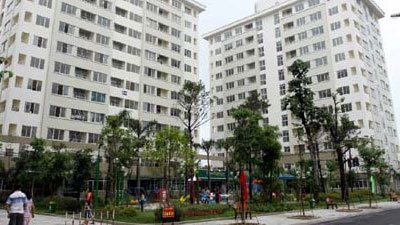Affordable housing key to Vietnam’s goals of increased productivity
(VOV) - As Vietnam continues to urbanize rapidly, adequate supply of affordable housing will be integral to achieving national development targets and enabling the country to maintain a high rate of growth, with cities contributing a growing share of jobs and GDP.
According to a new World Bank report - “Vietnam Affordable Housing - A Way Forward”, the structural shift out of rural areas and toward a higher-productivity manufacturing and service-based economy will drive population growth and new demand for housing in cities. The share of the urban population is expected to reach 50% by 2040, with an estimated 374,000 additional units needed in cities each year to cope with demand.
“Urbanization has been used as a tool to accelerate economic growth and poverty reduction in many countries around the world, and affordable housing will be instrumental to helping Vietnam achieve its goals for increasing productivity and inclusive urban growth,” the report states.
According to the report, despite economic growth, Vietnam still has a substantial deficit of quality housing. Almost 20% or approximately 4.8 million households in Vietnam are still living in poor conditions. Meanwhile, the majority of new demand for housing will be concentrated in only a few major cities and industrial zones. Together, the Red River Delta Region, surrounding Hanoi, and the South East Region around Ho Chi Minh City, will account for around two-thirds of the new housing demand.
 |
Vietnam has experienced several phases of housing policy in the past. Following liberalization of the sector, growth in the real estate sector spurred by foreign direct investment and speculation led to significant home price increases and supply in the luxury market that eventually resulted in a real estate bubble from 2009-2012.
The recent VND 30 trillion stimulus package, launched in 2012, has helped to reorient developers and lenders toward the affordable middle income market where there are real home ownership needs.
A revised Housing Law, passed by government in 2015, provides a strong legal framework for reforms with a new focus on supporting self-built housing, an active role for private sector in housing provision and addressing the shortage of affordable rental housing, especially for workers in industrial zones and students.
Toward that end, this report, which includes a comprehensive sector assessment and roadmap for affordable housing in Vietnam recommends the following key messages:
- Increase and reorient government spending in the housing sector. In particular, focusing on programs that support and target the lowest two income quintiles and high growth cities, where the need for housing is most urgent.
- Develop a National Affordable Housing Program that acts as a vehicle to implement the 2015 Housing Law and structure the government’s interventions in the housing sector. This Program would include initiatives to improve access to housing finance, stimulate supply of affordable rental housing and enable delivery of core housing to support the self-built housing sector.
- Prioritize structural reforms to improve governance of the housing sector and urban land management. Specific priorities are to strengthen an over-arching coordinating body that convenes all stakeholders and orchestrates implementation of selected housing initiatives, and to introduce reforms in the land taxation framework.
- Support market development by investing in the building blocks of a functioning housing sector, including regulatory reforms to incentivize greater private sector participation, improved real estate information systems, as well as monitoring and evaluation standards.
These key messages are further elaborated into a concrete set of policy and program options, organized into six priority areas of action, to help to inform and shape the government of Vietnam’s interventions in the housing sector moving forward.
